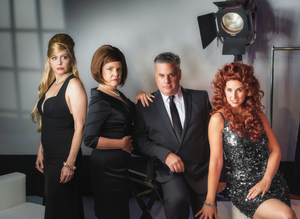Review: NINE Is A 'Ten' at At 3Below In San Jose

Holding court on a corner in downtown San Jose is 3Below Theaters and Lounge. It would be easier to say what they don't do but to use their own words they're "downtown San Jose's social spot for stage, screen, music, comedy, family fun and events." I'll just add that the complex is indeed a veritable mix of entertainment-for-all with delectable eats and great vibe. Yes, I digressed right out of the gate!
In the intimate Theatre 3 (seating for 250), they're staging Nine, the 1982 Tony-winning musical based loosely on Federico Fellini's semi-autobiographical film 8 ½. With music and lyrics by Maury Yeston and a book by Arthur Kopit, Nine is the story of Guido Contini (played to perfection by Stephen Guggenheim), a famous and philandering filmmaker (sound familiar?), who at 50 finds himself with a horrible case of writer's block. His last three films were colossal flops so there's a lot riding on this latest project. With his movie producer Lillian La Fleur (Elizabeth Palmer) and her partner Lina (Heather Mae Steffen) breathing down his neck, he wracks his brain and "his women" for inspiration.
Long-suffering wife Luisa (Susan Gundunas), sexy and frustrated mistress Carla (Becky Elizabeth Stout) and favorite leading lady and muse Claudia (Amy Bouchard) compete for attention, not only from him, but with the shadowy female figures from his past. They are Guido's Mother (Michelle Shannon) and the buxom prostitute from his youth, Saraghina (Krista Wigle.) With the exception of adult Guido and Guido at an Early Age (played sweetly by Elijah Seid-Valencia) these women form the center of an all-female cast who gravitates toward Guido like a magnet. Nonetheless, for a musical so focused on the needs of a powerful, petulant and self-centered man-boy, the show is inextricably female-focused.
Producer/director Scott Evan Guggenheim makes good use of the stage, using every inch to tell the story of Nine. His direction gave each actress an indelible personal context unique to each role. With actresses playing multiple roles, having the ability to tell them apart was greatly enhanced by both their skill and his direction. The size of the house meant that Musical director and star Stephen Guggenheim had to use pre-recorded tracks. While a live orchestra is generally the preference, using tracks is an art unto itself and this cast handled it beautifully.
Costume Designer Julie Engelbrecht, whose task it was to dress nine distinct female characters, created dazzlingly diverse costumes and wigs for the women that seemed to tell their backstories without a word being uttered. That's quite an art. The versatile Engelbrecht also created the set, which consisted of ten columns of flowing white satin cloth (perhaps representing the nine women and Guido?) that served multiple functions on the small stage. The white leather half-round settees were inspired. They functioned beautifully as the Venice Spa where Guido -- in a desperate bid for inspiration as well as the need to hide from his producer -- takes his wife. They're greeted by Our Lady of the Spa (who also functions as the narrator), played wonderfully by Heather Faulhaber. Guido has also invited his mistress Carla who has a sumptuous solo ("A Call From The Vatican") which makes sensuous use of the satin cloth and leather settees. Choreography by Shannon Guggenheim is spectacular.
Not to be outdone is Elizabeth Palmer as his middle-aged producer Lillian La Fleur. She has contracted with Guido to make a musical reminiscent of her days with the Folies-Bergère. In one swift move, she's in tights and a corset in a fantastic number (aptly called "Folies-Bergère") where she kick-steps with the best of them. But the big show-stopper is left in the able hands and vocal chops of Krista Wigle who, as Saraghina, belts "Be Italian" along with the entire cast who joins her in playing tambourines.
Through it all his wife Luisa seeks to help him as she always has done, even to the point of asking his muse Claudia to come to Venice. Gundunas has a wonderful turn in the ballad "My Husband Makes Movies" singing almost pragmatically of the creative complexities that a wife must contend with in an artist like Guido Contini.
When Claudia inadvertently gives Guido the idea to do a film about Casanova, he's instantly back to his selfish ways, casting aside the women who have consistently sustained him - even to the point of using his own fractured marriage in the film, much to Luisa's dismay. When art is at stake, and now that he has what he wants, he cares nothing for his wife or the other loving women in his life.
Composer and lyricist Maury Yeston, who initially created Nine in a theatre workshop, has said that Nine answers the question "What are women to men?" But perhaps it's with the perspective of the #MeToo movement that we can finally ask, "What are men to women?" Hopefully equals, but definitely not the only ones anymore with power and privilege enough to force women to seek a little of their stardust in order to find meaning and purpose in their lives. Viewing Nine from this perspective, one sees the women in Guido's life slowly come into their own. Too late, Guido realizes that they're no longer willing to be on the sidelines of his life. His younger self is left to console him as if to say, "It's time to grow up." Women everywhere couldn't agree more. Basta!
NINE
Music and Lyrics by Maury Yeston
Book by Arthur Kopit
Adapted from the Italian by Mario Fratti and based on Fellini's film, 8 ½
Now thru November 10, 2019
3Below Theatres & Lounge
www.3BelowTheaters.com
Photo Credit: Guggenheim Entertainment
Reader Reviews
Videos

